| Srl | Item |
| 1 |
ID:
152340
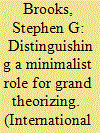

|
|
|
|
|
| Summary/Abstract |
A major theoretical shortcoming in international relations (IR) is the lack of any semblance of a common understanding regarding the role of grand theory. This article argues that explicit theoretical work of this sort is useful, but that a search for a single overarching grand theory to guide inquiry is misguided and that the primary business of IR is to form and evaluate middle-range theories.
|
|
|
|
|
|
|
|
|
|
|
|
|
|
|
|
| 2 |
ID:
152341
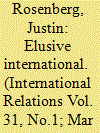

|
|
|
|
|
| Summary/Abstract |
This piece responds to the critical commentaries offered in this forum. I re-state the core aspects of the thesis and emphasize four themes related to theory in response to the critics: (1) Levels of Theory, (2) Locations of Theory, (3) Disciplines of Theory and (4) Ideologies of Theory.
|
|
|
|
|
|
|
|
|
|
|
|
|
|
|
|
| 3 |
ID:
152333
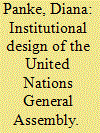

|
|
|
|
|
| Summary/Abstract |
Most international organizations are based on the principle of equality of states. Their institutional design grants all member states the same formal rights. Although formally equal, states differ immensely concerning their power capacities and size. Can institutional designs of international organizations mitigate real-world power- and size-related differences between member states, and if so, to which extent? To provide an answer, this article focuses on the United Nations General Assembly, which combines an equalizing institutional design with a large very heterogeneous membership. It shows that the strength of the equalizing effect varies across stages of the policy cycle. It is the weakest in the negotiation stage and the strongest in the final decision-making stage, while institutional design of international organizations has a de facto equalizing effect of medium strength in the agenda setting stage. Thus, while power and capacity differences matter, larger powerful states are not systematically better off throughout the entire policy cycle.
|
|
|
|
|
|
|
|
|
|
|
|
|
|
|
|
| 4 |
ID:
152337
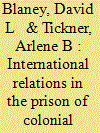

|
|
|
|
|
| Summary/Abstract |
This article argues that Justin Rosenberg’s proposal to reground IR in an ontology of societal multiplicity fails to account for the practices by which the field has erased multiplicity from its register and has sustained its identity through suppression of difference. We posit that the prison of colonial modernity, more than that of Political Science, is at the root of IR’s lack of a distinctive purpose, and that Rosenberg’s gesture toward uneven and combined development (UCD) as a sorely needed ‘big idea’ is insufficient for the jail break.
|
|
|
|
|
|
|
|
|
|
|
|
|
|
|
|
| 5 |
ID:
152336


|
|
|
|
|
| Summary/Abstract |
In the June issue of this journal (International Relations, Vol. 30, No. 2, pp. 127–153), we published an article entitled ‘International Relations in the prison of Political Science’ by Justin Rosenberg. It was an article we have been pleased to promote because it is rich in learning and thought-provoking in its ideas about the history and future of the discipline. Convinced that this will be a reference point in the continuing and necessary debate about International Relations (IR) as an academic project, we asked a small group of scholars associated with different theoretical perspectives to offer their comments on the article in order to carry forward the conversation about the what/who/how/and why of IR. Four brief essays follow, ending with Professor Rosenberg’s right of reply.
|
|
|
|
|
|
|
|
|
|
|
|
|
|
|
|
| 6 |
ID:
152334
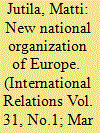

|
|
|
|
|
| Summary/Abstract |
Post–Cold War Europe witnessed the resurgence of different forms of nationalism and also the re-establishment of a minority rights regime. At the surface level, rights of national minorities seem to undermine nationalism as a political organization principle, but on a closer investigation the relationship between the two is more complex. This article uses insights from the English school’s theorizing on primary and secondary institutions to investigate the relationship between the primary institution of nationalism and secondary institution of minority rights regime. After a brief discussion of nationalism as a primary institution and its influence on the implementation of universal human rights, this article presents a detailed study of the minority rights regime analysing how it challenges, transforms and reproduces nationalism as a primary institution of contemporary European society of states.
|
|
|
|
|
|
|
|
|
|
|
|
|
|
|
|
| 7 |
ID:
152339
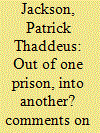

|
|
|
|
|
| Summary/Abstract |
This intervention, while highlighting points of agreement with Rosenberg’s arguments, also challenges Rosenberg’s characterization of the discipline. Specifically, this short intervention takes issue with the image of the field as International Relations as a discipline and multiplicity as its proposed core notion.
|
|
|
|
|
|
|
|
|
|
|
|
|
|
|
|
| 8 |
ID:
152335
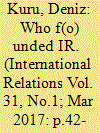

|
|
|
|
|
| Summary/Abstract |
This article aims to present a history of International Relations (IR) that looks at the role of three big American foundations (Carnegie Endowment for International Peace, Rockefeller, and Ford foundations) in the development of IR as an academic field in continental Europe. Its framework goes beyond the usual disciplinary history narratives that focus on IR’s US or UK trajectories, pointing instead to American foundations’ interwar and early post–World War II influence on French and German IR. The cases emphasize US foundations’ interactions with European scholars and international scholarly organizations as major factors shaping IR’s developmental pathways. This study offers a way to consider foundations’ role in IR’s gradual academic institutionalization by connecting disciplinary historical approaches to disciplinary sociology. Its sociologically conscious position underlines the significance of American philanthropies in a historical narrative and recognizes the relevance of transnational dynamics by going beyond usual emphases on ideas and national contexts.
|
|
|
|
|
|
|
|
|
|
|
|
|
|
|
|
| 9 |
ID:
152338
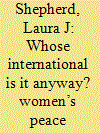

|
|
|
|
|
| Summary/Abstract |
This essay draws on insights from feminist scholarship to complicate the image presented of International Relations theory in Justin Rosenberg’s article ‘International Relations in the Prison of Political Science’. I suggest that Rosenberg’s careful and persuasive analysis proceeds from a number of assumptions about where ‘IR theory’ resides intellectually, and in whose bodies ‘IR theory expertise’ accrues.
|
|
|
|
|
|
|
|
|
|
|
|
|
|
|
|